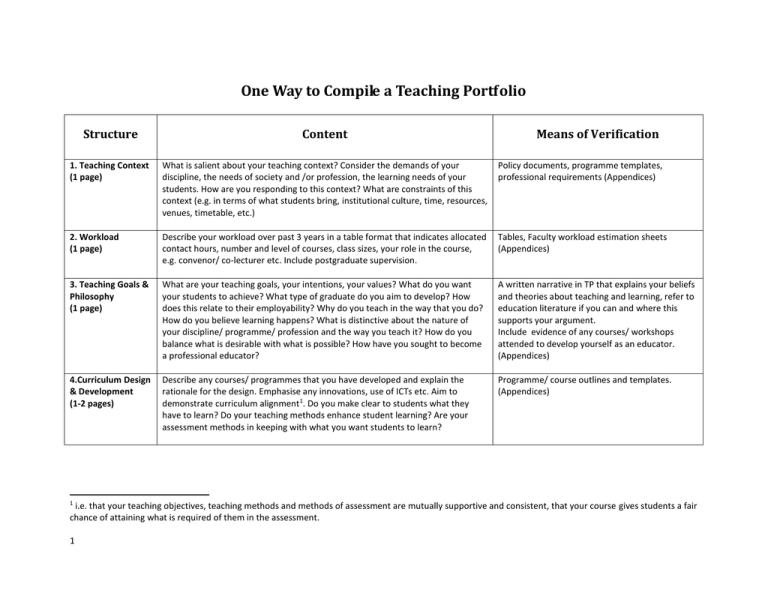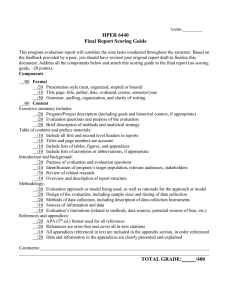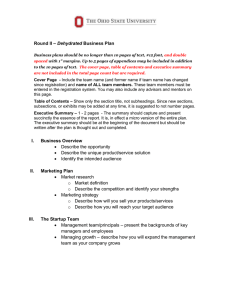One Way to Compile a Teaching Portfolio Structure Content Means of Verification
advertisement

One Way to Compile a Teaching Portfolio Structure Content 1. Teaching Context (1 page) What is salient about your teaching context? Consider the demands of your discipline, the needs of society and /or profession, the learning needs of your students. How are you responding to this context? What are constraints of this context (e.g. in terms of what students bring, institutional culture, time, resources, venues, timetable, etc.) Policy documents, programme templates, professional requirements (Appendices) 2. Workload (1 page) Describe your workload over past 3 years in a table format that indicates allocated contact hours, number and level of courses, class sizes, your role in the course, e.g. convenor/ co-lecturer etc. Include postgraduate supervision. Tables, Faculty workload estimation sheets (Appendices) 3. Teaching Goals & Philosophy (1 page) What are your teaching goals, your intentions, your values? What do you want your students to achieve? What type of graduate do you aim to develop? How does this relate to their employability? Why do you teach in the way that you do? How do you believe learning happens? What is distinctive about the nature of your discipline/ programme/ profession and the way you teach it? How do you balance what is desirable with what is possible? How have you sought to become a professional educator? A written narrative in TP that explains your beliefs and theories about teaching and learning, refer to education literature if you can and where this supports your argument. Include evidence of any courses/ workshops attended to develop yourself as an educator. (Appendices) 4.Curriculum Design & Development (1-2 pages) Describe any courses/ programmes that you have developed and explain the rationale for the design. Emphasise any innovations, use of ICTs etc. Aim to demonstrate curriculum alignment1. Do you make clear to students what they have to learn? Do your teaching methods enhance student learning? Are your assessment methods in keeping with what you want students to learn? Programme/ course outlines and templates. (Appendices) 1 Means of Verification i.e. that your teaching objectives, teaching methods and methods of assessment are mutually supportive and consistent, that your course gives students a fair chance of attaining what is required of them in the assessment. 1 5.Delivery: Teaching-learning methods Assessment methods Student feedback (2 pages) 6.Outcomes: Peer review Course performance results Graduation results (3 pages) Describe the teaching and assessment methods that you use, emphasising innovation. Where possible link these to your philosophy of teaching/ theory of learning. Aim to demonstrate curriculum alignment where appropriate. Examples of teaching-learning activities and assessment tasks, examples of feedback given to students. (Appendices) Provide an overview of feedback from students highlighting the effectiveness of / problems identified wrt your delivery, teaching and assessment methods. Copies of evaluation instruments. Summarised student feedback evaluations. (Appendices) What are the results of your teaching? What is its effect on student learning? To what extent have you achieved your teaching goals? Have your innovations been effective? Have your assumptions about learning held up in practice? External examiner reports. Table/ graph of course performance results over 3-5 years (IIU can give you these disaggregated by race & gender), programme cohort analyses where relevant. Supervision results, external examiner comments. (Appendices) 7.Lecturer Reflection (half page) Once you have presented the results of your teaching, talk back to it, reflect on the findings. You may want to explain negative findings/ disappointments and show how you have dealt/ will deal with these. Show your capacity for reflection and on-going improvement as much as out-right success. A written narrative in TP. 8.Impact (1 page) What is the long-term, wider impact of your educational work? What has been your wider contribution to the development of teaching & curriculum at various levels – Department/ Faculty/ University/ Profession/ field at large? What contributions have you made to educational policy, management or quality assurance? Examples of influence in your Dept/ Faculty/ Profession, committee work, etc. Invitations to lecture. External examining. Publications. Awards, other forms of recognition. Feedback from employers, graduates. (Appendices) 9.Conclusion (half page) Write a brief justification for your self-score using Faculty Guidelines/ criteria. 10-12 pages in all (excluding Appendices) 2

